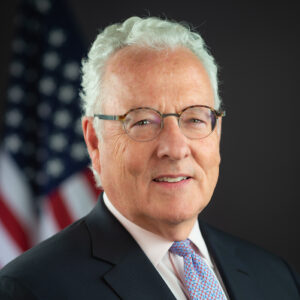I filed a motion for leave to intervene in the 2020 enforcement action of the U.S. Securities and Exchange Commission’s (SEC) SEC v. Ripple Labs. The motion asks Judge Analisa Torres of the U.S. District Court of the Southern District of New York to unseal the “Hinman Speech Documents.” The documents refer to a 2018 speech by then SEC Director of Corporation Finance William Hinman, which, absent explicit regulatory guidance, long constituted the best guess for crypto stakeholders to avoid an enforcement action. There are intense public interest issues at stake.
Moreover, the case serves as an important referendum on “regulation by enforcement” as defined by Carol R. Goforth in Regulation by Enforcement: Problems with the SEC’s Approach to Cryptoasset Regulation (2022). At issue are critical legal questions of whether the pursuit of enforcements against innovative technologies for lack of compliance and other purported harms are a legitimate use of taxpayer resources versus a forthright delineation of policy by the SEC, if not Congress.
Regulatory Guidance
If you search on cryptocurrency on the SEC’s website, you get two results: a link to the SEC’s page on investing in crypto assets and another on initial coin offerings. But if you want to learn whether and how to register a cryptocurrency as a security at the SEC, there is nothing. SEC Chairman Gary Gensler has said that crypto innovators should “come in and talk to us.” That is likely because Congress has not legislated on the issue, and the SEC itself has not conducted a proceeding to create rules. Thus Hinman’s speech of some 3100 words is all that’s available.
As a regulatory policy researcher, I find this odd. Hinman begins his speech by saying the comments are his opinion, not the SEC’s. Notably, the speech outlines 13 telltale questions which appear to be de facto guidance. Rulemaking is the bread and butter of sector specific agencies like the SEC, and it is hard to fathom that the SEC can proceed to regulate the entire U.S. crypto industry without explicit rules. Could it be that Hinman made this speech precisely to provide the SEC cover so that it could conduct enforcements without a set of rules?
In the speech, Hinman declared one crypto asset—Ethereum’s native token, ether —as outside the securities laws. Subsequently, the SEC launched the case against an Ethereum rival, Ripple, seeking billions in penalties for the offering of a token called XRP that reasonably appeared to fit Hinman’s criteria for ether.
Conflicts of interest claims emerged suggesting that Hinman had a financial stake in an entity promoting ether over competing coins like XRP. Separately, the government watchdog organization Empower Oversight sued the SEC to obtain materials that show Hinman received millions of dollars in retirement payments from his former law firm, Simpson Thacher & Bartlett (STB), which joined an alliance devoted to the exclusive promotion of Ethereum. The disclosures detailed how SEC Ethics officials repeatedly warned Hinman about recusing himself from anything that could even bring an appearance of any conflicts with STB.
In any event, unsealing the speech documents could clarify whether Ethereum’s proponents influenced Hinman’s speech and whether SEC officials debated the key questions about what makes a token a security. Typically such speeches are approved by agency counsel before going public. Such findings could strengthen the defense’s claim that the SEC failed to provide fair notice to Ripple and the rest of the market. If the SEC itself was confused or ambivalent about crypto policy, it follows that innovators and investors could be as well.
To Seal or Unseal: The Battle of Motions
To seal or unseal is a common debate in federal regulatory litigation. Former general counsel banking regulator Thomas P. Vartanian, founder of the Financial Technology & Cybersecurity Center and author of The Unhackable Internet: How Rebuilding Cyberspace Can Build Real Security and Prevent Financial Collapse explains: “While transparency protects a free flow of information in the agency process, courts will often be asked to decide if the privilege is being over-used. Courts may examine the evidence at issue in camera so it is only seen by a judge who can then determine the legitimate boundaries of the protection with specific knowledge of the information in question.” Indeed the SEC’s website lists Freedom of Information Act (FOIA) exemptions, notably for national security, trade secrets, and personnel issues.
The SEC’s counsel moved to seal the Hinman Documents, claiming they “reflect internal discussions and deliberations by numerous SEC officials” which should remain “confidential.
“SEC officials repeatedly express their views and positions on issues of programmatic significance to the SEC. The ability of agency officials to debate and collaborate with openness and candor would be hampered by the public dissemination of these documents,” the SEC’s motion said.
However, Congress has directed that internal agency communications are generally subject to a “presumption in favor of disclosure.” Outside of a few limited privileged areas, Congress has directed that agencies’ internal deliberations should be made public. The Court already determined that the Hinman Speech documents are not subject to the “deliberative process or attorney-client privileges.” It may be high legal hurdle for the SEC to then refuse to make public the backup of the speech.
My motion cites First Amendment and federal common law precedent to justify unsealing the speech documents. The press and the public have a “potent and fundamental presumptive right” to access “judicial documents” to ensure accountability and justice.
Regulatory capture and other negative impacts
The notion that a regulatory agency could favor one actor at the firm or industry’s request demonstrates the concept of “regulatory capture,” a defining concept in the 1971 “Theory of Economic Regulation” by George Stigler, who subsequently won the Nobel Prize in economics.
Stigler challenged the idea that regulation is conducted to protect the public but rather to serve industry. He noted how the SEC garnered the authority to limit selling expenses of mutual funds, thus limiting the growth of small mutual funds and hence reducing the sales costs of large funds. Building on Stigler, my own research of controversial “net neutrality” internet regulation across 50 countries over the last decade shows a similar trend of established firms (U.S. tech platforms) pressing for regulation to prevent market entry. While such “open internet” rules are proffered to ensure “the next Google,” they do the opposite by imposing a set of price and traffic controls that limit the ability of entrant services and applications to compete and differentiate.
The relevant case to reference for the impact of “regulation by enforcement” to innovation is Federal Trade Commission v. LabMD, which shows how a start-up fought back against the FTC and won, but only after “a decade after the alleged incident occurred, 7 years after the FTC began investigating, 4 years after the FTC issued an actual complaint, 3 years after the company closed its doors – and all without any evidence of actual consumer harm.” LabMD demonstrated that the FTC’s regulation by enforcement was unconstitutional, arbitrary, and capricious, but the litigation destroyed a valuable cancer diagnostic company.
The SEC’s heavy-handed approach may be a boon to emerging Asian economies which want to attract capital for crypto investment. Following its effective U.S. shutdown, RippleNet announced a partnership with South Korea’s Global Money Express GME Remittance and Thailand’s Siam Commercial Bank to carry out its international transactions. Ripple reports Asia Pacific as fast-growing region with transactions up by 130 percent year-over-year. Unlike the inscrutable SEC, the financial regulators of leading nations like the United Kingdom, Switzerland, Singapore, and Japan consider XRP a currency, not a security. Having different asset and regulatory classes likely attracts capital.
Regulation should only be adopted with targeted, limited aims for truly hard problems. Indeed the crypto industry has consistently asked Congress to develop the needed legislation to clarify the roles of U.S. regulators; presently at least eight agencies assert jurisdiction over crypto assets. The American failure to create a regime for crypto only harms investors and innovation, the very things the SEC purports to protect.
Disclosure: The author owns no cryptocurrency and has no financial interest in the SEC v. Ripple case. She has no relationship, financial or otherwise, with any parties in the article. She receives no compensation to study this topic but pursues it as part of her research on regulatory policy.


